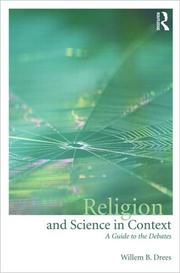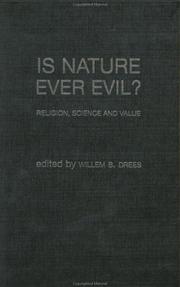| Listing 1 - 10 of 22 | << page >> |
Sort by
|
Book
ISBN: 9789087280598 9789048507924 9048507928 9781282129252 1282129252 9087280599 9786612129254 Year: 2009 Publisher: Amsterdam : Leiden University Press,
Abstract | Keywords | Export | Availability | Bookmark
 Loading...
Loading...Choose an application
- Reference Manager
- EndNote
- RefWorks (Direct export to RefWorks)
What does it mean to be human in a world of technology? What could be the role of religion in responding to the ecological crisis? Should we be concerned about the modification of food, and even of ourselves? Who do we trust to make decisions regarding our common future? What do we use our technology for? These are not questions for experts only. How can the wider public be involved? Do experts and the general public trust each other sufficiently? Or is the public ignorant, in the eyes of the scientists? And are too many engineers narrow minded, according to the general public? The contributors to this timely and necessary volume address expertise, trust and engagement, as we consider our technological condition , religious resources for the ecological crisis , biotechnology , and matters of trust between scientists and the general public. With contributions from leading scholars in the field, including James Miller from Queen's University, Canada and Tony Watling from the University College, London, this book will captivate a range of readers interested in the spirtitual dimension of our culture and society.
Ecology --- Technology --- Genetic engineering --- Biotechnology --- Religion and science. --- Religious aspects. --- Human ecology --- Religion and science --- 241.65*7 --- Christianity and science --- Geology --- Geology and religion --- Science --- Science and religion --- Ecotheology --- 241.65*7 Theologische ethiek: natuur; ecologie --- Theologische ethiek: natuur; ecologie --- Religious aspects --- philosophy --- ecology --- technology --- trust --- religie --- filosofie --- motion pictures --- film --- religion --- modification --- God --- Human --- Internet

ISBN: 9780415556163 9780415556170 9780203869604 9781135275075 9781135275112 9781135275129 Year: 2010 Publisher: London Routledge
Abstract | Keywords | Export | Availability | Bookmark
 Loading...
Loading...Choose an application
- Reference Manager
- EndNote
- RefWorks (Direct export to RefWorks)
Book
ISBN: 9024268648 Year: 1992 Publisher: Kampen Kok
Abstract | Keywords | Export | Availability | Bookmark
 Loading...
Loading...Choose an application
- Reference Manager
- EndNote
- RefWorks (Direct export to RefWorks)
#GGSB: Dogmatiek --- Christian religion --- Pure sciences. Natural sciences (general) --- Dogmatiek

ISBN: 9781134436705 113443670X 1280052716 0415290600 0203398173 1134436696 9780203398173 9781134436651 9781134436699 9780415290609 9780415290616 Year: 2004 Publisher: New York
Abstract | Keywords | Export | Availability | Bookmark
 Loading...
Loading...Choose an application
- Reference Manager
- EndNote
- RefWorks (Direct export to RefWorks)
Philosophy of nature. --- Nature --- Science --- Christian ethics. --- Ethical theology --- Moral theology --- Theology, Ethical --- Theology, Moral --- Christian life --- Christian philosophy --- Religious ethics --- Science and ethics --- Nature, Philosophy of --- Natural theology --- Moral and ethical aspects. --- Religious aspects --- Christianity. --- Philosophy
Book
ISBN: 1108974619 1108976727 1108975771 1108838413 Year: 2021 Publisher: Cambridge ; New York, NY : Cambridge University Press,
Abstract | Keywords | Export | Availability | Bookmark
 Loading...
Loading...Choose an application
- Reference Manager
- EndNote
- RefWorks (Direct export to RefWorks)
What are the humanities for? The question has perhaps never seemed more urgent. While student numbers have grown in higher education, universities and colleges increasingly have encouraged students to opt for courses in STEM (science, technology, engineering and mathematics) or take programs in applied subjects like business and management. When tertiary learning has taken such a notably utilitarian turn, the humanities are judged to have lost their centrality. Willem B. Drees has no wish nostalgically to prioritize the humanities so as to retrieve some lost high culture. But he does urge us to adopt a clearer conception of the humanities as more than just practical vehicles for profit or education. He argues that these disciplines, while serving society, are also intrinsic to our humanity. His bold ideas about how to think with greater humanistic coherence mark this topical book out as unmissable reading for all those involved in academe, especially those in higher educational policy or leadership positions.
Book
Year: 1989 Publisher: Groningen: [éditeur inconnu],
Abstract | Keywords | Export | Availability | Bookmark
 Loading...
Loading...Choose an application
- Reference Manager
- EndNote
- RefWorks (Direct export to RefWorks)
Book
Year: 1997 Publisher: Kampen Kok
Abstract | Keywords | Export | Availability | Bookmark
 Loading...
Loading...Choose an application
- Reference Manager
- EndNote
- RefWorks (Direct export to RefWorks)
Book
Year: 1991 Publisher: Kampen Kok
Abstract | Keywords | Export | Availability | Bookmark
 Loading...
Loading...Choose an application
- Reference Manager
- EndNote
- RefWorks (Direct export to RefWorks)
Book
Year: 1997 Publisher: Kampen Kok
Abstract | Keywords | Export | Availability | Bookmark
 Loading...
Loading...Choose an application
- Reference Manager
- EndNote
- RefWorks (Direct export to RefWorks)
Book
Year: 1994 Publisher: Baarn Ambo
Abstract | Keywords | Export | Availability | Bookmark
 Loading...
Loading...Choose an application
- Reference Manager
- EndNote
- RefWorks (Direct export to RefWorks)
| Listing 1 - 10 of 22 | << page >> |
Sort by
|

 Search
Search Feedback
Feedback About UniCat
About UniCat  Help
Help News
News